#and only tyrans
Text
Parallax feels for y'all
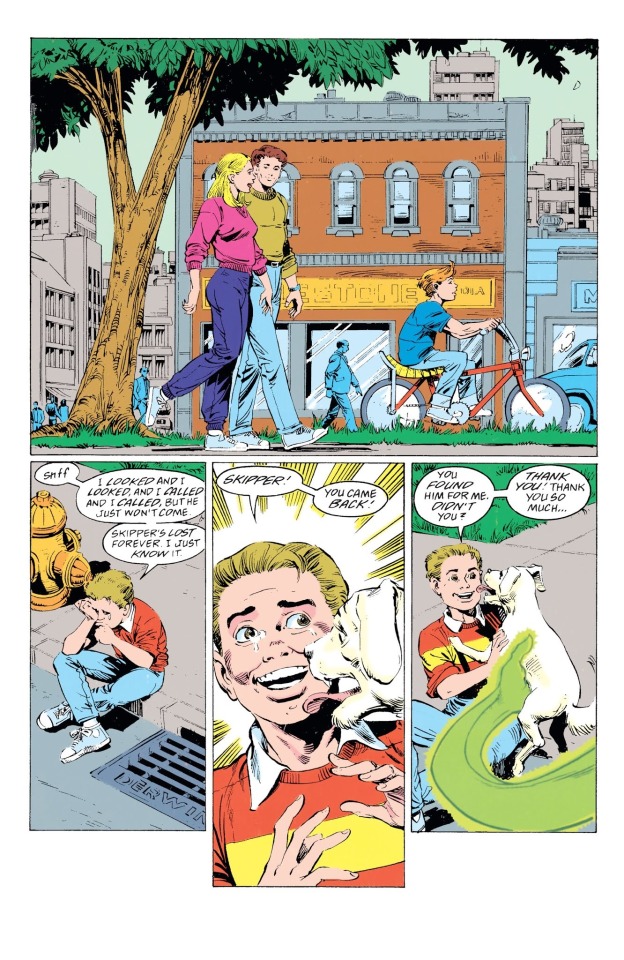
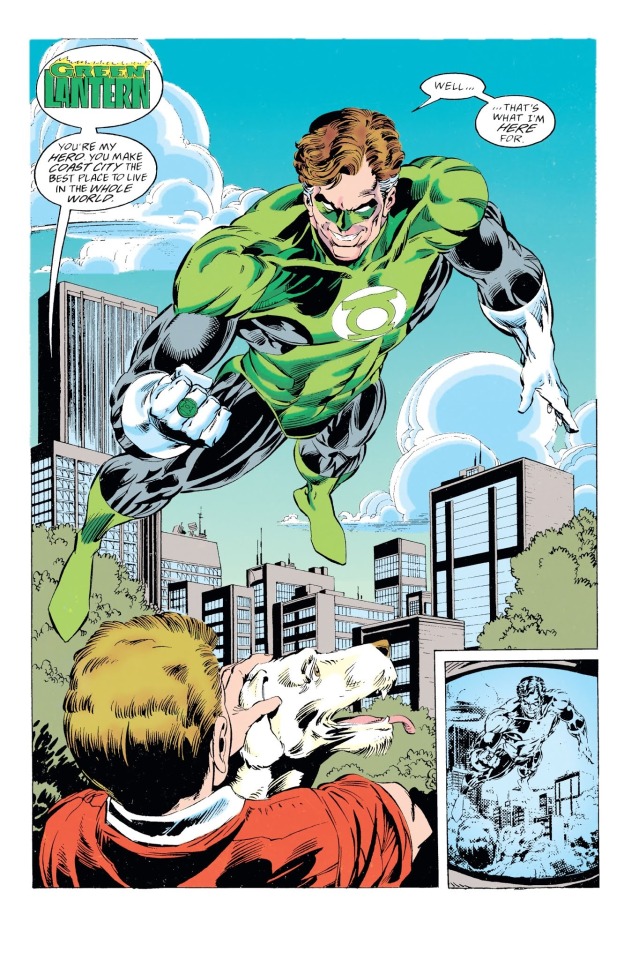

#i've been thinking about this for hours. Like it's so sad.#This happened immidiately after Hal gives up his ring to Kyle and Ganthet gives him powers#I've also been thinking about the gardiens and the way they're portrayed and seen as#Like the people who'd only read this issue they'd think Hal is selfish or just overwhelmed by grief#But it's so much more than that#When Hal calls the gardiens “Blue tyrans” it's not only genuine but also legitimate#The gardiens take a lot of autonomy from corps members like asking hal to kill his friend Priest in 1960 GL special issue 2#And they've done a lot of terrible things that can't be erased in anyway#One good example are the manhunters (failing which led to the GL corp) and gold lantern replacing the GL in legion of superhero timeline.#Like I've gotten into comics WAY after watching animated marvel and dc stuff because TV#But I've been thinking about the Green lantern animated serie (how good it was) and the manhunters and the guardiens#Anyway my rambling is useless but I just wanted to post a thing about Hal#Sad feeling aside can you feel the babygirlism in the last panel#hal jordan#green lantern#parallax#Hope the tumblr girlies (gender neutral) are proud of themselves#They infected me with the Parallax fangirlism#sunnyscript#sunnyscriptpost#comics posting#sunnyscripttags
72 notes
·
View notes
Text

Horrible realizations you make after joking about fancams and trending on tweeter after bringing someone groceries and getting fanart made of you.
#Down Your Spine ;; OOC#Chase Your Fate ;; Tyran Brooke#tbf with how the show works they probably haven't actually blown up in popularity yet#but considering post-production is so slim since.. well all the effects are real and they just need to work on splicing stuff together well#:smolnoelle: much to consider i hate that this realization comes only now
4 notes
·
View notes
Text

tyran.
#finally got a concept design yippee!!!#i really wanted to add more warm colors in his design but i think this is better balanced#maybe ill say fuck it and give him the scarlet wings instead#i gotta figure out more of the backstory of those in his lineage first tho#bc if im gonna give him the same scale color as redwing i want there to be actual parallels between them#and so far the only ones are that they both were kings and they both were important but in opposite ways#(redwing sorta founded the underworld and saved half the species from genocide whereas tyran got possessed and fucked shit up bad lol)#but for now he has purple scales like his granddaughter#purple's kinda the default anyway. since its the most common by a lot#my art#destiny-alduran
1 note
·
View note
Text
sometimes i wonder weather my trauma actually shapes me as a person.. i used to think that i was capable of acting like a normal functioning adult but these days ive been noticing a lot of flaws that could be explained by my childhood
#like the fact that im so indecisive and the fact that i always let ppl choose what they want and follow along#the fact that im incapable to stand up for myself and to set boundaries#and the fact that im a people pleaser#it's all bc my mom is a fucking tyran and the only thing i could ever do was to follow orders and do exactly as she pleased otherwise i -#-would get the beating lf my life#every aspect of my personality always ended up oppressed and crushed to death and trampled on#also the fact that im so inexperienced and that i don't know how real life works can be explained by the fact that i am literally never-#-allowed to leave the house#i really need to work on myself#i need to break free#and i need to go out more#diary
1 note
·
View note
Text
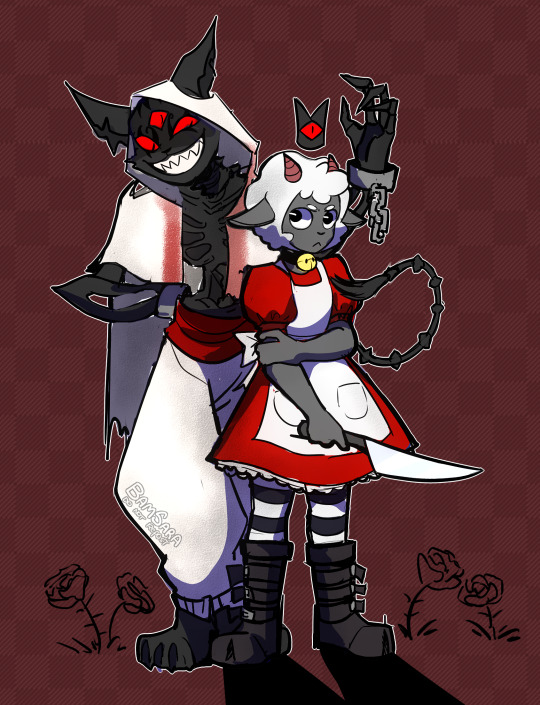
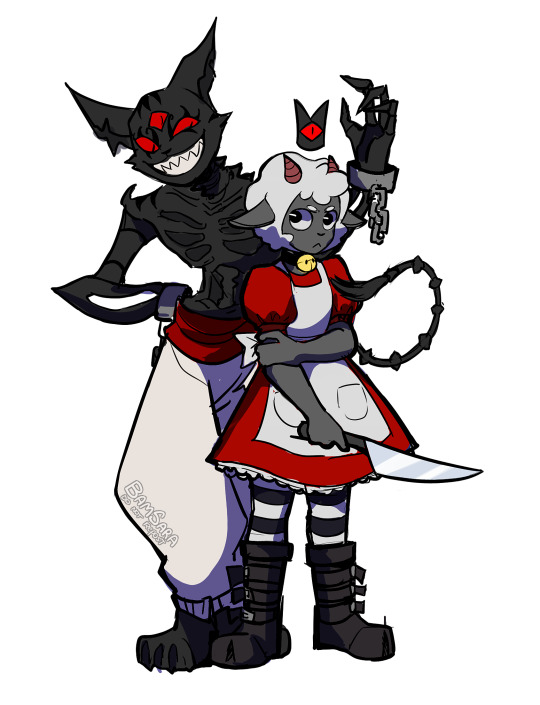
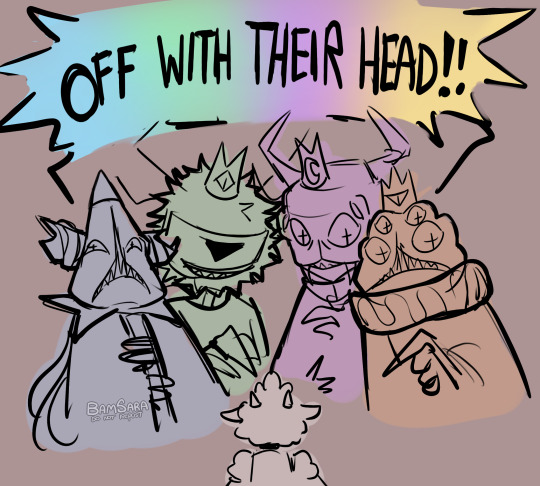
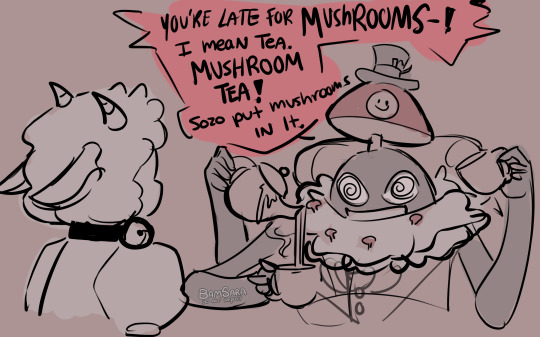
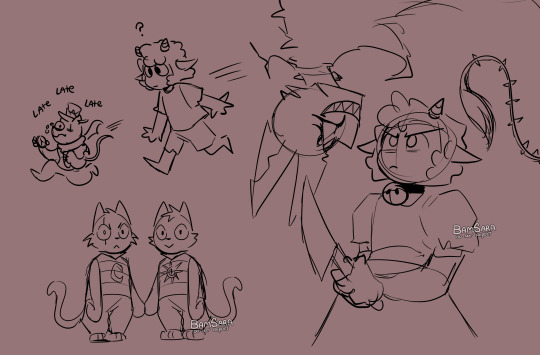

Cult of the Lamb x Alice in Wonderland / Alice: Madness Returns crossover AU idea
Taking aspects and aesthetics from each and mashing them together with some tweaks to make up an AU that I may or may not write a multishot chapter fic for. Narilamb included + possible Leshycat
AU summary:
After following a one-eyed rat and falling into Wonderland, The Lamb is captured and sentenced to death by decapitation, only to be saved last second by a mysterious grinning cat.
They learn that they are a Lamb of prophecy: the one to defeat the tyranical rulers of Wonderland: King Leshy, Queen Heket, King Kallamar, and Majesty Shamura to free wonderland from their oppressive rule. The rulers keep an iron grip on this world's inhabitants by threatening with their own abilities, as well as a promise of a monster under their control. Legend says that there was also a fifth ruler long ago, and rumors say that after a argument, that the royal siblings either sealed him away, or fed him to the monster they claim to keep.
Yet no one has laid eyes on this creature in nearly a thousand years. Not that anyone wants to risk that, though.
Making friends and mad allies alike, the Lamb traverses through Wonderland with a three-eyed and constantly smiling cat as their trustworthy guide, who although helpful, shares little of his own motives as to why he's assisting the Lamb in the first place.
(Tags for this AU will be 'Wonderlamb Au')
#Wonderlamb Au#cult of the lamb#cotl au#cotl narinder#cotl leshy#cotl sozo#cotl heket#cotl kallamar#cotl shamura#cotl lamb#doodles#alice in wonderland au
5K notes
·
View notes
Note
Hi Gallus, I'm doing some worldbuilding and you seem like you could be connected enough for me to find an answer to the problem of dwarven agriculture. Many problems are created by the requirement of no sunlight, as even the common response of mushrooms still need light to break down decomposing matter as a primary energy source. Currently, we're thinking that they use a special type of mushroom that breaks down rocks in an energy-producing reaction, giving them enough energy to absorb nutrients and grow - this would serve a second purpose in explaining why building a massive hollowed-out mountain fortress doesn't produce an equally large amount of gravel.
Any thoughts? We're grasping at straws kinda lol
Well, some thoughts:
There's plenty of cave systems (especially Karst Systems) that are at least partially open to Sunlight- especially the kind that have rivers running through them, which is something else that's really helpful for agriculture.
For Example: This Cool AF Sinkhole cave in china that has an entire Forest in it

Now There's a view to put outside the city Gates!
Karst specifically is a landscape where underground rivers hollow out the limestone underground and then the cave roofs fall in. This kind of landscape answers your gravel question nicely: the hollowed out mountain does produce an equal amount of gravel, but the gravel turns up as the sandy banks of the river system hundreds of miles away.
So, there's your sunlight that can be used directly, or reflected or magically transferred deeper into the cave system.
Or they just put more holes in the roof! Unless your dwarves are also vampires, there's no reason for them to not hollow out a few Skylights into the mountain too.
But let's talk some other cave ecology and agriculture!
For starters, your dwarves could be sitting on top of a literal gold mine that would allow them to trade for a lot of needed materials and crops.
And by gold mine, I mean Salt Mine.
Historically, salt comes out of hollowed-out mountains and is worth more than gold.
Also something the humans have historically fought a bunch of wars over, so there's some free political tensions if you needed that!
I can also mean the possible fucking enormous piles of bat guano that accumulates in Karst caves, which is the world's most insanely good fertilizer, and ALSO something that has been worth more than it's weight in gold.
Speaking of Gold, another thing that often lives in sinkhole caves in abundance is BEES. turns out, limestone stalactites are a terrific place to build a hive that is difficult for predators to reach, stays dry and the stone substrate means the hives can reach many tons in weight before they start having structural issues. That sweet, sweet insect-derived liquid gold is already important to Dwarves in a lot of folklore- it's really hard to have a Traditional Dwarven Mead Hall without the honey to make the mead, you know?
So you got your mushrooms, you got your sunlight-grown sinkhole crops, you got your traded goods and you got your source of alcohol- the only thing really missing from an ancient food pyramid here is a staple carbohydrate. To that end, may I propose our good Peruvian Friend: The Potato.
Grain crops aren't actually all that nutritious and were kept around in ancient societies more as legal tender that kept the peasants busy, because wheat or rice takes months to grow, an enormous amount of labor to harvest, and wheat also needs to be milled before it can be turned into food- all enormously time-consuming processes that keep peasants busy and easy to rule tyranically over.
Potatoes though? Pop one in the ground in spring and you can dig up fingerlings all summer, and if you make potato towers, you can harvest up to 40lbs of delicious, easy-to-prepare-and-store carb out of a single plant- a real space-saver for the limited sinkhole skyspace.
If your dwarves have cheese, the potato makes even more sense, because Potato+dairy is the easiest, most nutritionally complete survival food there is.
Finally, consider: Dwarven Vodka.
This post is open for anyone to comment suggestions on, but that's my take: put your dwarves in a Karst-sinkhole cave system, give them a highly in demand resource like salt or guano, bees, and taters. Boom. Whole agriculture, economy and political scheme starters.
1K notes
·
View notes
Note
Hiii! Would like to request for mingyu + 45 pleaseee. Thank you!
hi, love!💜 thanks for the request, hopefully you will like it!
45. kiss out of anger (kim mingyu)
'you're being insufferable.'
'me? who's the one with all the dramatics here?' mingyu throws both of his hands in the air, twirling around like some kind of ballerina to make his point.
you sceptically raise your eyebrow. 'yep. i'm the one with dramatics here.'
mingyu huffs and rolls his eyes, but settles against the couch comfortable, staring you down. honestly, you two've been going over this whole thing for the past two hours and you are very close to simply storming out of this room. the only reason of you staying put is because you know that mingyu won't let you go very far - he'll catch you and bring you back and will make you stay here until we both come to some kind of a conclusion. right now it looks impossible but mingyu is an optimist, so he tries again: 'listen, i'm asking for one thing. can't you just give in once?'
'mingyu, don't make it sound like i'm the tyran who never gives in to you. i said no, can't you just let it be? i'm tired of explaining the same thing over and over again.'
'well then explain once again, because i didn't get anything.' he crosses his arms over the chest and glares, making a whole show of 'i am staying here and not moving'. 'and while you're at it, maybe think that if i'm not getting it because you're not making any sense.'
deep breath. you take a deep breath and close your eyes, because staring at mingyu right now makes your desire to punch him in the face skyrocket. mingyu is such a 'let's solve it right now' guy, while you are 'i need time to think' girl and it's a miracle how you both stay together for such a long time despite this difference. and maybe this is what you need to focus on right now? that you both stayed together despite it and how this is not your first ever fight. there were many fights but you still stayed together and logically you know that this fight will dissolve too, but it's hard to stay calm at this exact moment. 'kim mingyu,' you call out in a tired voice, 'i think it's time we both take a break in this fight. you go to the kitchen, i'll stay here and how about we meet in an hour and come back to this topic again?'
mingyu pouts. 'thirty minutes.'
'one hour, mingyu.' you push strictly, glaring at him. 'is that too much to ask?'
'one hour is way too long,' he comments and god, he's still pouting. why your boyfriend is an overgrown child? why you are so hopelessly in love with him? 'okay, forty minutes. but we both stay here, i'm not going to the kitchen. what if you start crying? i need to be here.'
how mingyu manages to be both heart-wrenchingly endearing and annoying as fuck is beyond you. 'you're either going to the kitchen or i'm leaving this apartment, mingyu.'
'fine!' he stands up from the couch, obviously angry. 'fine! have it your way! i'm going to the kitchen!'
he stomps for dramatic effect and your can't help but smile a little at that. god, what a child. you love him so much. before moving to turn away, mingyu suddenly rushes towards you and kisses you soundly on the mouth, not letting you even take a breath.
'wha-'
'i love you,' he says angrily, frowning. 'you're pissing me off right now, but i love you. don't forget it. got it?' you nod dazedly. 'good. now i'm off to the kitchen. call me if you start crying.'
you weakly push on his shoulders, suddenly feeling like you're about to cry. 'i'm not gonna cry.'
'mhm.' mingyu rolls his eyes and walks away. 'tissues are on your left.'
#seventeen imagine#seventeen fluff#mingyu#seventeen scenarios#kim mingyu x reader#kim mingyu fluff#seventeen kim mingyu#kim mingyu imagines#kim mingyu#svt mingyu#svt x reader#seventeen x reader#mingyu x reader#raise your hand if you also see mingyu so clearly in this
301 notes
·
View notes
Text
Things Inupiaq culture doesn't traditionally have:
Kings/royalty (requiring tribute from the people you lead is seen as tyranical and tyrants are killed when possible)
A cash economy (dentallium shells were valued by many other cultures and sometimes were used as money in international trade, but not among fellow Inupiat)
Agriculture (we are traditionally a hunter-gatherer people seasonally following the herds, fish, and ripening greens and berries)
Corporal punishment (you aren't even supposed to yell at people or even scold children)
Slavery (you could argue this one since women were sometimes captured and taken as wives; but this is typically regarded as an ancient and morally questionable practice. The Inupiat didn't believe in owning people or their labor, only at best associating through marriage, blood relation, or wife-exchange)
Primogeniture as a hard-fast rule (Inupiat culture was traditionally patriarchal so a son may inherit his father's status as a family patriarch if he is already a father at this time, but material inheritence was not guaranteed to work that way)
A written language (historians were assigned to memorize records, family trees, and the like)
Human or animal sacrifices (would be considered cruel and wasteful)
Formal vs informal language (socio-economic class is mutable and does not affect language)
Gendered pronouns (our language uses pronouns to indicate tone of a sentence the way many languages use pronunciation, as well as relationship between subject and object in complex sentences and in all cases whether the subject is singular, dual, or plural and if the sentence is in first, second, or third person. An absolute fuckton of pronouns and none of them are gendered)
Raw meat taboo (except in the case of pregnancy; the arctic climate means the weather was not too far off from refrigerator or freezer temperatures, if not colder, and underground storage was often placed around frozen methane deposits known as permafrost)
Dog meat taboo (dogs were helpful as beasts of burden or sometimes hunting companions but when there's a famine you gotta eat what you can)
Many ceremonies taken for granted (for example, if a man and woman mutually agreed they were married, that was the only wedding required. We had big celebrations for survival, and women got incredible face tattoos for coming of age, but many lifestages were celebrated more low-key with little pomp and circumstance)
Shirts (you didn't wear anything underneath your atigi, and if it was too warm for it, you took it off. Yes, even women. Presbyterian missionaries thought we were godless sluts for our tits out ways)
Virginity marriage requirement (it was best if a woman hadn't had sex before but only because we lived in small communities and you have to keep track of bloodlines. Having sex didn't make girls unclean or impure and unwed mothers were taken care of by their families and weren't stigmatized)
Required monogomy (men could have multiple wives and women could have multiple husbands, wife exchange was a means of fostering allegiance, and the main problem with cheating is that it involved lying and prioritizing pleasure over duties like making sure your husband doesn't fall to his death while hunting. In stories about cheating and revenge, the cheater and retaliating jealous partner are both depicted as in the wrong)
There are more, but these i feel provide a pretty good basic idea of the culture. You can use these bits of info as Water Tribe worldbuilding inspo if you want, but i won't pester you into it. I just think my culture is neat and wanted to share ^-^
#eskimo on main#might talk about captured wives one of these days because that concept always facinated me
1K notes
·
View notes
Text
Summing up jaune's crossover ships 2!!!
WARNING THIS POST IS FOR COMEDY ONLY! I'M NOT CRITICIZING YOUR SHIP OR ANYTHING LIKE THAT!
1- Fate Apocrypha
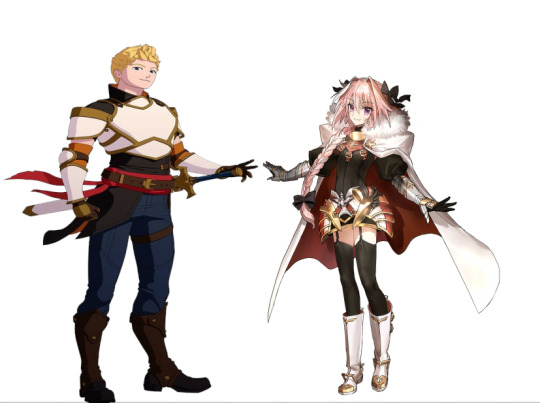
This ship has two scenarios: You are a fan of fate apocrypha or you think jaune and astolfo would be like this:
''Hey astolfo do you want smash?'' ''Yes jaune I want you to smash me with your beautiful and giant muscles and make me yours! Breed my bussy!'' ''Bro i just asked if you wanna play smash bros''
2- Arcman
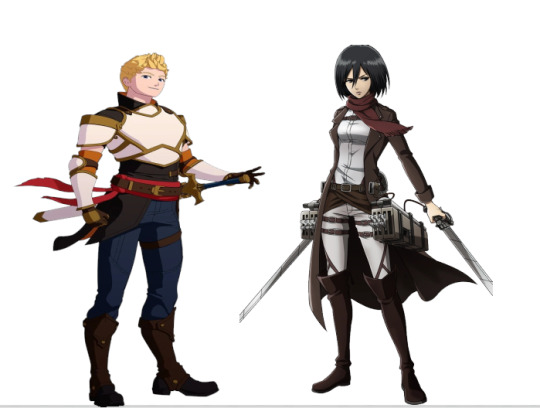
I believe that people who like this ship like the ''golden retriever boy with a black cat girl'' theme. Also dead boyfriend and dead Girlfriend.
3- Yo-Yo Knight
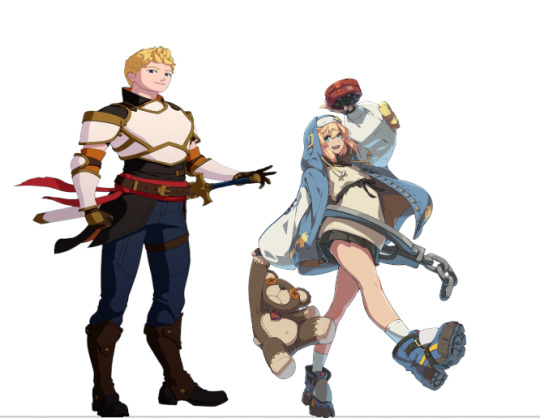
Congratulations, jaune, you're going to have your sweatshirt stolen all the time. But seriously, it's a cute ship and I imagine Jaune is surprised and impressed by Yo-Yo's tricks.
4- The power of love
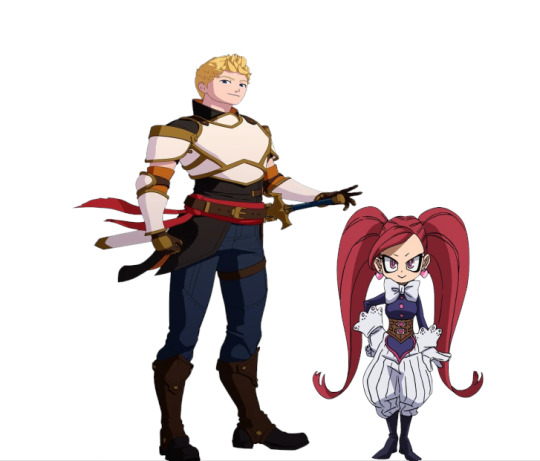
You are a height difference fan and enjoy shortstacks. And I believe that Jaune would be the most affectionate guy with her.
5- Crazy Knight

This is if Tyran was a chick and wanted Jaune to be his boyfriend. And goodbye to the boy's pelvis.
6- Spider Knight

Well, that would be a really cool relationship to explore. Like gwen trying to hide her secret life as a spider woman from jaune. But I believe that Jaune would find out at some point and wouldn't deal with Gwen and would try to help her in some way.
7- Hack and Slash
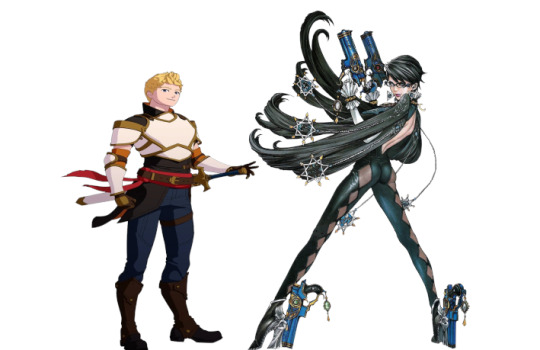
Congratulations jaune your hair is so powerful that it attracted one of the strongest milfs. We really have to follow what Nora says...
8- Holy Knight
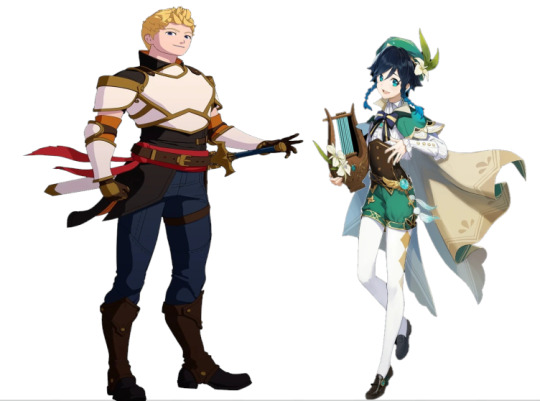
These two make a cute couple but now imagine when Venti gets drunk how much flirting he would do to Jaune.
9-Deadly Alliance

This ship here is the phrase ''i can fix her'' but very extreme!
10- Jewellery Knight

''Then something just snapped, something inside of me. I didn’t care anymore. I didn’t care about being better than Ruby, i didn’t care about being a Huntsman. I DIDN’T CARE IF I’D LIVE. I DIDN’T CARE ABOUT ANYTHING.''
#rwby#jaune arc#rwby shitpost#crossover ships#Astolfo#fate series#mikasa ackerman#bridget#la brava#juri han#spider gwen#bayonetta#Venti#mileena#rogue the bat
178 notes
·
View notes
Text
:¨ ·.· ¨: osamu miya's valentine special.
`· . ꔫ sypnosis: in which you ask osamu how to bake a cake for your crush. osamu, heartbroken, willingly teaches you without him knowing that he was your crush all along.
content: (🦷) tooth-rotting fluff, minor hurt with comfort, osamu thinking his love was unrequited, reader is a cheeky one, inaccurate recipe.
⚠ warning/s: none.
my HQ masterlist. (valentine's edition)

"i need help." was the first thing you said to osamu today. "wow, not even a "good mornin'"?" he jokes. you only continued to look at him with a serious expression, which meant that you weren't in a joking mood. osamu gulped. you could be really intimidating sometimes..
"..what do you need my help fer?"
"i need you to teach me how to bake a cake for valentine's day." you admitted. now, atsumu, the elder twin who happened to be sitting right next to osamu, was intrigued. "a cake?" atsumu chuckles, "you gonna give that to yer li'l crush, or what?"
the way your eyes widened with the innocent pair of your red cheeks broke osamu's heart. atsumu's eyes, too, were widened at the unexpected reaction from you. he looked over at the younger twin with sympathy, knowing how he's been madly in love with you ever since middle school. yeah, they fight like tyranical pigs, but at the end of the day, they're still family.
osamu coughed, trying to clear the sudden dryness in his throat. "oh— yeah. okay. sure, i'll teach ya." he assures you, and the way your face lit up was just adorable. but the aching fact that you were this ecstatic to bake a cake for someone that wasn't him was just painful.
"is after school alright?" you asked, and osamu nodded. once you left to go to your own classroom, osamu looked over at atsumu with a wounded expression.
"told ya she didn't like me." he mumbles, "i'd like the three pudding packs we bet on, please."
"..got it."
time skip.
you walked home with the miya twins. since osamu would be teaching you how to bake, atsumu wanted to tag along "just for the fun of it." he claims.
but atsumu had a plan.
it's called:
"make-y/n-fall-for-osamu-by-being-extra-annoying."
he thinks it's a brilliant name. spot on.
you unlocked the door to your house and showed the twins where the shoe rack was. once they took their shoes off, you dropped two pairs of house slippers, letting them switch shoes and rest on the couch. "wait here, i'll just go and change." you excused yourself from the twins to put on some more comfortable clothes.
the house was tidy. there was a wall of framed pictures that caught osamu's eye. most of them were of you when you were younger. there was one of you with a pet, one of you smiling with a missing tooth, another with you eating ice cream, and plenty more. it made osamu unknowingly smile.
atsumu cringed.
sure, he's trying to make you fall for osamu, but that doesn't mean he's magically immune from the lovesick glances of his brother.
"okay, i'm back!" you returned in a nice set of pajamas and your hair tied into low pigtails. "so cute!" both the twins thought as they clenched their chests.
"i want to bake a heart-shaped red velvet cake so that it fits in with the theme of valentine's. do you think he'd like something like that?" you asked osamu with a cheeky little smile, hinting toward your crush.
"it'll be from you. of course he'd like it." osamu thought out loud, and your jaw drops momentarily. "o- oh! you think so?" you said, bashfully rubbing the back of your head. "yes. i'm sure of it." he replied.
silence. it was so overbearing that atsumu had to hold in his own cough.
"d- do you have any cream cheese? it'd be good for the frostin'." he asked, trying to clear the tension in the air. you looked inside your fridge and found two blocks of cream cheese. "mhm!"
"okay. let's wash our hands, then i'll tell you what to do." he said. you went to the kitchen, and osamu looks over at atsumu, who was watching the two interact before him with a smirk. "don't do anythin' stupid." osamu said before following you into the kitchen. "ha?! like i'd do anythin' stupid, stupid!" atsumu exclaimed in offense.
time skip.
you held a white, clean, apron in front of you with a gleeful little smile. "y'know it's not really necessary to wear one, right? especially since we're just doin' this at home." osamu says.
you nod it off, "yes, i know, but i've always wanted to wear one of these!" you tie the laces comfortably around your nape and you then reach for the ones near your waist next.
osamu reaches over and ties it for you. "is this okay?" he asks. you nod, your heart beating erratically against your chest at the kind gesture.
"you two gotta knock it off with the lovey-doveyness, it's givin' me a headache." atsumu says, and osamu snaps his head at the older twin with an exasperated expression "nevermind, i think my head is fine." atsumu quickly replies.
time skip.
you laid all of the ingredients, needed utensils, measuring cups, bowls, and appliances out on your kitchen table gracefully. now, you were just staring at osamu for his instructions. unbeknownst to you, osamu found your expression right now very cute.
"so.. what now?" you asked.
"right— okay."
"focus, 'samu. i get that y/n is cute & all, but y'gotta teach her sooner or later." atsumu said from the dining table. he just wanted to watch, and.. perhaps commentate.
what atsumu said brought both your faces aflame. "shut yer trap, 'tsumu. if you're just here to watch us, go home." osamu scolded. "no way! m'definitely helpin'." atsumu raised his own hands as if he's been caught, "just not in the way you think." atsumu says under his breath.
time skip.
you're trying, keyword: trying, to whisk the egg whites together, but it's not getting to the meringue texture you're aiming for. osamu sees you struggling and decides to help you. he stands closely behind you and puts his large palm over your own hand that's holding the whisk. "like this." he mutters lowly as he demonstrates, using your hand to whisk the egg whites. soon enough, you notice that the texture is finally changing!
"woah! osamu, you're a genius!" you cheered, your eyes sparkling at the clear difference.
osamu smiles softly. this feels oddly domestic..
"if you both keep standin' close like that, i'm gonna start thinkin' you're husband and wife." atsumu interrupts your sweet moment with a fact, and osamu is quick to distance himself from you. "will you be quiet for just once in yer damned life..?" osamu murmured, ignoring the sudden rise in the temperature.
atsumu shrugs, "m'just sayin'!"
time skip.
the cake is finally finished. osamu let you deal with the designs as you wanted it to be special and from the heart. it ended up being prim and perfect, a cake that screamed you. just like how you wanted.
"thank you for helping me, 'samu. and thank you 'tsumu for.. coming over?" you expressed your gratitude in a mildly uncertain way. "it was nothin'." atsumu grinned as if he had just accomplished something great.
he didn't even know if his plan worked, but he did enjoy watching you and osamu interact today.
"see ya tomorrow, y/n!" atsumu bids his goodbyes, and he's out of sight. now, you're left with osamu. "i— uhm.. see you tomorrow, 'samu!" you squeaked, and before osamu could reply, you closed the door on him.
osamu sighs. his twin was probably being too pushy with the teasing today, and he must've made things weird between you two.
which is what he thinks.
thanks to atsumu, you're rolling around on the floor like a child, giggling over the number of comments he made earlier about you and osamu looking all cute together.
while you couldn't wait for valentine's, osamu was practically dreading it.
time skip.
you can tell that osamu has been avoiding you. the way he dodged your attempts of hugging him or the way he didn't answer when you called out his name.
you didn't know exactly why he was doing this, but you had a small idea.
it was the end of the day, and you saw osamu walking home alone. you asked atsumu to stay behind for a bit so as not to ruin the moment.
"boo!" you attempted to spook osamu, and since he looked like he was deep in thought, you succeeded. he flinched and looked behind him to see the one and only culprit. you.
"oh, y/n." he recognizes your cute face, "did you give the cake to yer crush yet? how'd it go?" he asked one question after another, even though he really didn't want to know the answer.
"nope. he kept avoiding me for some reason." you said. osamu only hummed in sympathy.
"but.. now that i have him here, alone, i was thinking that he'd stop avoiding me now?" you brought the boxed cake to osamu's view, and his eyes widened.
"wh—"
"osamu miya, i like you." you finally confess, "actually, i've.. loved you since middle school."
osamu mentally facepalms. his feelings were requited since middle school?! he wasted so many years holding himself back from intertwining fingers, kissing you, and most importantly, showering you in all the affection you deserve. what an idiot!
but this time, he doesn't waste any more of his given seconds.
he cups your cheek and kisses you.
the moment atsumu hears about this, he's going to be boasting about the fact that he brought you two together in your wedding ceremony. even though he most absolutely did not.

© lowercase intended | loveephia
#haikyuu fluff#haikyuu!!#hq x reader#hq x y/n#haikyuu headcanons#haikyuu imagines#haikyuu x y/n#hq hcs#tooth rotting fluff#hq#haikyū!!#osamu x y/n#osamu miya#hq osamu#osamu x you#osamu x reader#osamu imagine#valentines#atsumu miya#hq atsumu
1K notes
·
View notes
Note
Who treated Mai worse, Azula or Zuko?
Guys, be serious, I love Azula and I love her dynamic with Mai, but come the fuck on, it's REALLY difficult for ANY dynamic between ANY characters to be as unhealthy as Azula's dynamic with literally every character in the story.
The first thing Mai says to Azula is a joke about possibly being murdered by her. When she refuses to follow orders in "The Drill", Mai says Azula can shoot all the lightning she wants at her. And at the Boiling Rock, Azula literally says "You know the consequences" and then they only don't have fight, potentially to the death, because Ty Lee intervenes.
Compare that to Mai ending things with Zuko when he's being too much of a dick, or simply her feeling free to call him out on his bad behavior, without feeling any fear of "consequences."
She knows Zuko would never use his position as a prince to have leverage over her. She never bows to him like she does to Azula, she never gets ordered around and side-eyes him like it happened with Azula during "The Headband", and we never see Zuko WANTING Mai to fear him so he can get her to do as she's told, or sending her to prison after they had a falling out
Azula treats Mai with far more respect than she does most people, but the power imbalance is still very much there and Azula takes advantage of it ALL THE TIME. She WANTS Mai to be too afraid to truly stand up against her or so much as say "I don't wanna be friends anymore because I don't like how you treat me."
No amount of typical teenage overreaction to jealousy can compare to "I don't trust that you won't banish, imprison, hurt or kill me if I do something you don't like."
Zuko is Mai's flawed, but caring boyfriend. His status as a prince/Fire Lord never comes up except when it is to her benefit (being spoiled by servants or getting out of jail). Meanwhile, Azula is Mai's tyranical princess that happens to think of her as a friend, but doesn't actually treat her with the basic respect a friend should.
34 notes
·
View notes
Text
C’Tan Shard of the Deceiver in the style of Sonichu (CWC)


I lied. This is my favorite figure. Commentary under cut.
#1: Rule Number One Is That You Gotta Have Fun
The other two figures I painted had ups and downs--days genuinely ruined and many frustrated moments where I just hated everything about this hobby and everything I was making. I'm sure this is no strange feeling to any artist, but since I kinda gave up on art over a decade ago only to pick this up after that decade, it really felt like that heartbreaking moment of making something that you know was bad and not improving fast enough.
I never had that for one second while painting Sonichu. I honestly giggled to myself a lot when I worked on him. When something fucked up (note how I didn't make as good of a glowing effect on the eyes) I just took that as "Well, that's just me being accurate to the original art." When something went well, I learned something that I would be able to apply in the future. If you look closely at the quills and the chest, you'll see that this was the first time I tried edge highlighting to get more of a good lighting effect. On top of that, I just used Baharroth Blue without a base paint, but rather as a base paint that I later darkened with a Tyran Blue shade wash for the creases in the sash. I did the same for the skin near on his abs and arms. (I should have made them blue. Damn.)
I also didn't get so bogged down in being accurate to the inspiration, or became better at knowing what to pick and choose. For example: Sonichu doesn't have a sash, of course. Instead, I decided to go with the color of the banner in Issue #0.

There was a point I briefly considered learning how to actually make a decal, then taking the title to be plastered on the front of the model, but I decided against it. I even considered some yellow streaks to give him a bit of a glow, but if you look at the base you'll see some of the experimental wetblending I tried (and would hypothetically cover later) and it just didn't look good.
Also the feet. Sonichu does have a distinct color for his shoes, but I just shrugged and figured it was more correct to just keep it in line with his hands on the model. I made the hands in the hideous style of the Bad Trailer Sonic, and figured the feet would probably follow the same principle. Besides, the sash had enough blue as it is.

#2: Rule Number Two - Just Don't Get Attached, Too
I said I had fun at all stages painting Sonic'hu, and I meant that. The painting part, that is. Gluing was a disaster.
If you're new to the hobby, understand this: Older models, things from the 90's or earlier, are produced using a plastic resin. It's very light gray (left) while the newer stuff has a dark gray tint and is made with a different kind of plastic.
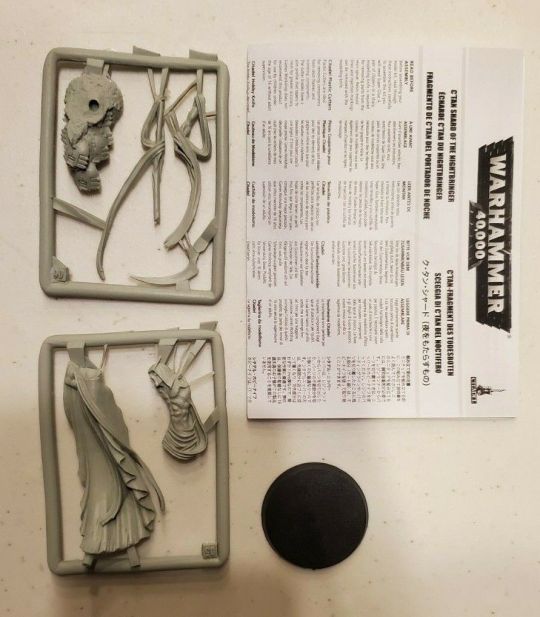
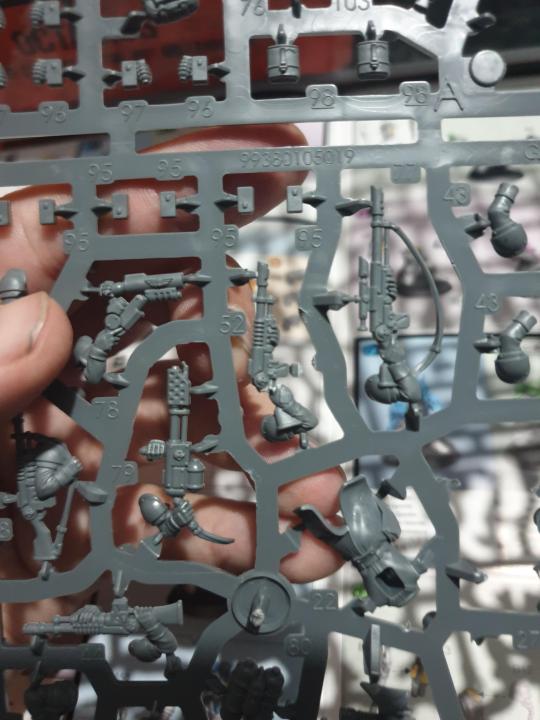
Now Citadel sells ONE (1) glue, pictured to the left. It's a very good glue for the DARK GRAY plastic. It looks like this. Some people use the one on the right, but the listing on Amazon is apparently sketchy as hell and comes empty because they can scam you out of your money since you can't return or refund liquids. So I never fw it; if I encounter it in a hardware store or hobby shop, I'll pick it up and give it a shot.


This is all to ultimately say that in spite of Citadel selling only ONE KIND OF GLUE, that ONE GLUE cannot hold light gray resin figures together AT ALL.
I don't have pictures, but God was it frustrating. Sonic'hu would CONSTANTLY fall apart while drying. I would be holding his arm in place; the head would fall off. His spines would fall off. He'd flop over on his base. Even after priming him, his arm fell off again, and you can see his face is a mess of when my fingers were just covered and glue and I was just holding him in place frustratedly. I tried like three different glues (not including Tamiya, but Krazy Glue was one) and I don't remember which one worked.
However, whether Tamiya works or not, I actually did have to go back to resin on a different figure recently. I went through my old man's drawer and found this.

It's unreal how good this is. Put this on resin, and the plastic itself comes apart easier than the glue does. It also works okay on the dark gray figures, but I've had the odd part come undone and I went back to the Citadel Glue.
Fair warning though--I'm praising this version of Loctite specifically. There are a few varieties, and I can't say much as far as their quality, but I read online that the ones with an extra long cap tend to dry out and be unopenable later. This Gel Control version doesn't give me any problems like that, though.
#3: Rule Number Three - Wear Your Heart On Your Cheek
My only regret is not going harder with this.
There were some gemstones at the bottom of this model and I literally don't remember what happened to them. I was going to paint them like Chaos Emeralds, originally. Then I saw a paint job of the model that had stones encircling the C'tan Shard like he was making them rise up Dragonball style, and the thought came to mind to get little Chaos Emerald replicas to look as though they were orbiting him. (Unfortunately, Etsy pretty much only had them in a set size, and though Sonic'hu was the largest figure I'd worked on, he was too small to have those orbiting around him.)
I also wanted to learn how to model with Green Stuff using this model; there was a point where I considered making the actual sneakers, but more importantly the Pikachu ears and the one additional spine to bring it up to six total. I didn't not want to do that when I bought it, actually, but after the glue had settled after so much effort I was utterly sick of the prep phase and just went straight to painting.
There's also a little Necron that is at the base of the C'Tan that I also haven't painted, but the reason for that is that I am considering how to do the CWC's "The Classic" shirt on his rib cage. I keep waiting for the inspiration to strike.

So that's Sonic'hu. Honestly, having a shitpost figure was something that helped me be a little less afraid of failure and take chances, make mistakes, and get messy. I would resume tryharding by the next figure, and ultimately paint, in my opinion, my best figure yet.
#Sonichu#CWC#Christine Weston Chandler#Painting Warhammer#Games Workshop#Warhammer#Warhammer 40K#WarhammerCommunity#Warhammer 40000#WH 40K#WH40K#Warhammer40K#Warhammer Painting#Miniature Painting#Painting Miniatures#Mini Painting#Necron#Necrons#Necron'tyr#C'tan#The C'tan#Shard of the Deceiver
54 notes
·
View notes
Text
i think what i truly makes my skin crawl about political opponents is when they sound so righteous, when they sound so indignated, when they sound so aggrieved in the name of causes that are monstrous.
im talking about the mother who cries inconsolably about the hardships that women, and specially mothers have to endure under patriarchy for the sake of their children, because their daughter transitioned into a boy. im talking about the man who waves a flag proudly proclaiming that their voices wont be silenced, that they wont be crushed under tyranical boots but he is waving the confederate flag. im talking about people who give impassionate speeches about how every life is sacred, how to kill another fellow human being is horrendous, that all are born equal with the same rights no matter their condition, in order to make abortion illegal
there is just something that feels fundamentally profane about that. like, no, says my monkey brain, this is not how the world should be, stories tell me that highly passionate touching speeches about right and wrong should only be said by those who are actually right.
more than whatever harmful ideology is being used to push for, is the improper use of the tool itself what is really grating. what really activates my "destroy on sight" instinct. it feels like it cheapens something that should be held sacred.
it makes it feel that, no matter how much our hearts want to believe otherwise, powerful, moving, emotionally touching speeches and passionate gestures cannot be trusted as a way to distinguish right from wrong.
and that is true. they cant. they cant, they cant, they simply CANNOT.
we cannot be guided by the beauty of our weapons. we can only be guided by cold impassonate truths. by boring, rigorous, tedious, careful reason. that is the only thing we can trust and even that can fail.
79 notes
·
View notes
Text
I see why MegaSound isn't a relationship that should work out , like it is really deep and get very sentimental, but it is like vanilla cake compare to the passionate disaster that is MegaStar, MegOp or even MegaMax
It can be sweet, but it really is like Japanese pudding compared to American cupcakes in sweetness, considering ThunderSound, JazzSound, or SoundBlaster is a thing
The problem with the ship itself is that they are surrounded by BETTER OPTIONS in their own story(Megatron need someone who can deal with him, Soundwave need someone he doesn't need to deal with)
The ship has both sad and sweet elements, but it can't focus on one because of the nature of the characters themselves. Megatron is a tyran and Soundwave is an enabler
Megatron treats others the way he thinks is best because he has a Pit mentality(bottom of society miner turn famous Gradiator, violence is basically it own language to Megatron), and Soundwave whom never knows how one should be treated to begin with(don't forget Soundwave is a homeless mech who got pick up by Sentinor Ratbat because he not only is he a telepath, but also very vulnerable)
Both lives desperate life, trying to cling on to the first person who believed in them or treat them with respect
Just because it could have worked out doesn't mean that it should
But.... I... hum... also... really pudding
Note: damn i have this one in my draft since forever now, finally decided to share, to just have it out there
I doubt anyone will see it, but it makes me smile knowing my ramble is seen by some unfortunate souls
#god i hate Ratbat#remember everyone Soundwave have 5 cassette become i refuse to acknowledge the 6 one#transformers#megasound#rambles
27 notes
·
View notes
Text
ok so we saw how the administration dealt with foreign objects like the dragons cores, but i wonder what they would’ve done with ninjagos(& other realms) mythical objects like the realm crystal, the sword of sanctuary, teapot of tyran,,,,, would they have destroyed them as well or kept them locked away for a later use?? anywho this is how i lead into my headcanon of administration jay having the sword of souls and the only reason he works for them is bc he’s in debt to the administrator for giving him the sword, he doesn’t understand why he wanted the sword so badly but he knows it’s something from his past life.
#does this make sense#i’m aware that this is such a stretch but my mind is going crazy waiting for jay info#ninjago#kunsho#lego ninjago#ninjago jay#ninjago dragons rising#ninjago spoilers#suit jay
81 notes
·
View notes
Note
Can you please give an explainer on the friendship between Robespierre and Desmoulins and what their dynamic together was like? I know they were at school together as kids but were they really as close as movies usually portray them as? Was Robespierre better friends with Saint-Just?
Bonus: What's the story behind Desmoulins using Roussaeau against Robespierre?
Merci!
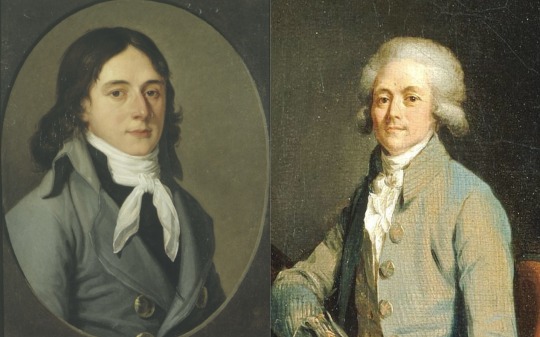
That’s an interesting question considering how often their relationship, as you say, has gotten dramatized.
The good days of the relationship
Both Robespierre and Desmoulins started attending the boarding school of Louis-le-Grand at the age of eleven, the former in 1769, the latter in 1771. We don’t know when exactly they first ran into and/or got to know each other, nor exactly just how close or not they actually grew to be while at college. To me, the following two statements do however suggest that their relationship back then was at least better than ”mere acquaintances”:
Oh, my dear Robespierre! It is not long since we were sighing together over our country’s servitude, since, drawing from the same sources the sacred love of liberty and equality, amid so many professors whose lessons only taught us to detest our land, we were complaining there was no professor of cabals who would teach us to free it, when we were regretting the tribune of Rome and Athens, how far was I from thinking that the day of a constitution a thousand times more beautiful was so close to shining on us, and that you, in the tribune of the French people, would be one of the firmest ramparts of the nascent freedom!
Desmoulins in number 15 of Révolutions de France et de Brabant (March 8 1790)
I knew Camille in college, he was my study companion, he was then a talented young man without mature judgement. Since then Camille has developed the most ardent love of the Republic;... one must not look only at one point in his moral life, one must take the whole of it; one must examine him as a whole.
Robespierre defends Camille at the Jacobins December 14 1793 (only time he ever admitted to a college friendship with anyone at all)
Liévin-Bonaventure Proyart, who worked at the college up until 1778, would give the following description of the relationship Desmoulins and Robespierre had back then in his La vie et les crimes de Robespierre: surnommé le Tyran… (1795):
In his lower classes, and however young he had been, [Robespierre] was very rarely seen sharing the amusements and games which most please childhood. His cold and misanthropic heart never knew those outpourings of lively and frank joy, natural signs of candor and ingenuity. Of all the noisy and endlessly varied amusements which make the public recreation of a college such an animated scene, none pleased him, and he preferred dark reveries and solitary walks. If someone, at these moments, approached him, he received him with a cold gravity; and answered him at first only in monofyllables. If he took it upon himself to praise his style and his scholastic productions, Robespierre did him the favor of striking up a conversation with him. But, however little one ventured to thwart him, one instantly became the object of some harsh and virulent trait. Camille Desmoulins, who lived at the same college, and whose impetuous and untidy character did not adapt well to the philosophical arrogance of Robespierre, had from time to time grapples with him, but from then on as since, the champions did not fight on equal terms. Always more reflective than the opponent who provoked him, and more master of his moves, Robespierre, watching the moment, pounced on him with all the advantage that cold prudence has over temerity.
Fellow students Beffroy de Reigny and Stanislas Fréron would in the latter half of the 1790’s similarly make the contradiction of stating both that the young Robespierre didn’t have any friends at school and that he and Desmoulins had been college comrades (Beffroy writing that Robespierre was ”his (Desmoulins’) comrade and mine” and Fréron that Desmoulins was Robespierre’s ”childhood comrade”). Though given the time these texts were written, I think this might should be read more as these Robespierre-dislikers wanting to have the cake and eat it too (ergo they both want Robespierre to have killed his childhood friend and to have been so repulsive he had no friends at all) than as full blown evidence Camille was Robespierre’s ”only friend” at school as the latter puts it in La Terreur et la Vertu.
Finally, Marcellin Matton, when writing a short biography over Camille in 1834, stated the following regarding his college days:
It was [at Louis-le Grand] that Camille got to know Maximilien Robespierre. They differed in character, but both had this passion which always distinguishes men of genius — love for liberty and for independence. The fully republican education one gave to young people born to live under a monarchy contributed a lot to their character. Without stop and in all forms, one presented them with history of Gracchus, Brutus, Cato. Camille was always together with Robespierre and their conversation most often revolved around the constitution of the Roman Republic.
While this certainly sounds like it could just be romantizing, we do know Matton was friends with Camille’s mother-in-law and sister-in-law, and it it’s therefore possible it’s them (who in their turn would have gotten it from Camille) who have given him this account of a close college relationship.
It’s sometimes argued that Robespierre and Desmoulins can’t have been friends while at school since they were never in the same grade, and it therefore would have been really hard for them to socialize. And indeed, when looking over the school regulations that were in motion during their time there, that does indeed come off as quite a hard thing to do — students were to stick to their ”quarter” both in dormitories, during classes, study hall, on Sunday outings, and at table (at first I thought maybe these ”quarters” weren’t neccessarily made up of students who all came from the same grade, but this other piece seems to rule out that possibility). This leaves the thirty-minute recesses as the only places where students from different quarters would have gotten a chance to interact with one another (bc they all seemed to have recess at the same time according to the schedule…). I do however think Robespierre and Desmoulins’ own testimonies weigh heavier than this. Desmoulins would also go on to admit college friendships with other students we know for a fact can never have been in the same grade as him.
In 1774 and 1775, both Robespierre and Desmoulins’ names featured on the list of students that had been awarded annual prizes for their hard labors, which means that they, according to the regulations, got presented before the bureau of administration by the principal ”to there receive praise and rewards due to their work and the success of their studies” together.
After graduating (Robespierre in 1781, Desmoulins in 1785) the two seemingly lost sight of one another, at least we don’t have any evidence they corresponded or in other ways kept up contact. Two pieces do however show us they did not forget about each other entirely. The first is a letter dated spring 1786 Camille adressed to the aforementioned Beffroy de Reigny, who in January the same year had openly thanked his ”former study comrade Robespiere [sic]” for sending him two of his works as a gift.
It was noticed lately, as a misfortune attached to the house where we were brought up together, that none of those who had distinguished themselves there fulfilled in the world the hopes that he had first given, that you alone seem happier right now, and we rejoice in your many subscribers. Although the subscribers are your dear and beloved cousins, we can clearly see that you have not forgotten the rest of the family, nor lost sight of the mountain where we were the first to applaud you. The advantageous manner in which you have spoken of M. Robespiere [sic] has charmed us all; up to now, M. Jéhanne has missed only one opportunity to provide you with the occasion of doing him justice as well. The joy with which you gave well deserved praise to a comrade reproached me for my conduct towards you, and obliges me to retract.
In 1793, Robespierre did in his turn admit to before the revolution have read a poem (that according to Camille had been written in 1787), and felt proud once he realized who the author was:
Remember that at a time when the monarchy was best established on its foundations, Camille, a simple individual, without support, without advocate or patron, a lawyer without a cause on the fourth floor, dared to put into verse the proudest principles of the most determined Republican. Then, in the depths of my province, I learned with secret pleasure that the author was one of my college comrades.
Interestingly, Robespierre’s younger brother Augustin started studying law at Louis-le-Grand in 1784, one year before Camille graduated from said program, although neither would claim to have known the other while at college.
On May 8 1789, Desmoulins authored a letter to his father, telling him about the opening of the Estates General at Versailles three days earlier. Lamenting the fact he himself didn’t get elected for it, he writes: ”one of my comrades has been more fortunate than I, it’s de Robespierre, deputy from Arras. He has been wise enough to plead in his own province.” The fact Camille was able to recognize Robespierre eight years after their separation (and care about it enough to write it down), could be read as yet another sign their college relationship had at least mattered somewhat, especially since this letter is from before Robespierre had made any kind of name for himself politically. How exactly Camille found out Robespierre had been elected (did he recognize his face in a crowd, accidentally run into him or just see it written down somewhere?) is however unknown.
After the ceremony, Camille did however head back to Paris, while Robespierre would remain at Versailles up until October 1789. On July 23 1789, the latter writes to his friend Antoine Buissart that he has been shown the stormed Bastille after the king and the National Assembly’s brief visit to Paris following July 14, but there’s no evidence he saw Desmoulins during it, or even that he knew he had been the one inciting the storming at this point.
In the beginning of September, Camille released Discours de la Lanterne aux Parisiens, the first of his works which he mentioned Robespierre in:
I would at least congratulate M. de Robespierre for opposing with all his strength the release of the Duke of Vauguyon. M. Glaizen opposed it in an even more eloquent manner. Member of the criminal committee, he resigned immediately. This speaks of conviction. Honor to MM. Glaizen and Robespierre!
Later the same month, Camille went back to Versaille after having been invited by Mirabeau, and the day after his arrival (September 20 1789) he could write to tell his father: ”If you hear bad things said about me, console yourself with the memory of the testimony that MM. de Mirabeau, Target, M. de Robespierre, Gleizal and more than two hundred deputies gave me.” Camille stayed with Mirabeau for two weeks before returning to Paris, but there’s no proof he saw Robespierre any more times during his stay.
When Robespierre too went to Paris soon thereafter, he settled in an apartment on Rue de Saintonge, today a 45 minute walk away from Camille’s erstwhile home on Rue de Tournon 19. Despite finally living in the same city again, it’s not until March 6 1790 I’ve discovered something more concreate tying the two together. It’s a note from Desmoulins to Robespierre, found listed in Mémoires de l’Académie des sciences, agriculture, commerce, belles-lettres et arts du département de la Somme (1907) as one of many Desmoulins related text published in Journal de Vervins during the summer of 1884. Unfortunately, I can’t find this journal online anywhere, so I don’t know what the note was about.
In November 1789, Camille founded his very first journal — Révolutions de France et de Brabant — that would run until the fall of 1791. Searching for the term ”Robespierre” in the seven digitalized volumes of the journal, I find Camille talking about him around 85 times. The first time is in number 4 (released December 19 1789), where he makes sure to underline the fact that he and Robespierre had been ”college comrades”:
…If my dear college comrade, Robespierre, had said the same thing to the viscount, he wouldn’t have been able to respond like Saint Peter.
This was the first in a long series of homages Desmoulins’ journal would pay Robespierre. Throughout the years, he called him among other things ”The last of Romans and my hero” (number 41, September 6 1790), ”So pure, so inflexible, the peak of patriotism” (number 46, October 11 1790), ”the living commentary on the Declaration of Rights” (number 65, February 21 1791) and ”immutable” (number 76, May 9 1791). Desmoulins was also second in giving Robespierre the famous nickname ”the Incorruptible.” Not even Robespierre’s erstwhile boyfriend brother in arms Pétion, where Camille still admitted it was impossible to speak of one without thinking about the other (number 55, December 13 1790) got the same almost saintlike treatment. While Robespierre got praised by several journals positive to the revolution, I don’t think it would be that unfair to say Desmoulins was his cheerleader number one during at least its first few years. Several times, Robespierre also sent Camille speeches and letters of his which the latter willfully inserted into his journal (1, 2, 3).
I’ve found only one time Révolutions de France et de Brabant had something negative to say about Robespierre, and it is in number 27, released on May 31 1790, and conviently enough, the next piece of information regarding Desmoulins and Robespierre’s relationship that I know of:
I wasted my time preaching the republic. The republic and democracy are now down, and it is unfortunate for an author to shout in the desert and to write pages as worthless, as little listened to, as the motions of J. F. Maury. Since I despair of overcoming insurmountable currents, tied for six months to the bench of rowers, perhaps I would do well to regain the shore, and throw away a useless oar. I should leave Garnery, continue writing Révolutions de France et de Brabant at a discount, without attempting with my librarian, the unequal struggle of Tournon with Prudhomme. But I hear Robespierre call my discouragement corruption, and exclaim that I am sold like the others to the King's wife and to the ministerial party. I must undeceive my dear Robespierre, I must give new proofs of my incorruptibility every week, show that I am as proud a republican as he is, and that when the number of patriots, which is diminishing prodigiously every day, would be reduced to one or two citizens, it is I who would like to remain the last of the Jacobins. […] How is it that I was accused of being a sold-out journalist, and that I saw Robespierre and L... among my slanderers, when it is so difficult to find proofs of corruption against me? […] So I could not have my neck wrapped in a handkerchief and complain of esquinancia without being reproached for argyrancia as well. Ungrateful Robespierre!
A week later, June 7 1790, Robespierre authors the following letter to Desmoulins, in response to something the latter has written about him in the number of his journal released right after the one quoted above:
Monsieur,
I read the following passage regarding the decree from May 22 on the right of war and peace in your (votre) latest number of Révolutions de France et de Brabant: On Saturday, May 22, the little dauphin applauded a decree Mirabeau had put forward with a good sense way beyond his young years. The people applauded too. It led back in triumph Barnave, Péthion [sic], Lameth, d'Aiguillon, Duport, and all the illustrious Jacobins; imagiening itself having just won a great victory, and these deputies had the weakness to maintain it in an error which they enjoyed. Robespierre was more frank, he said to the multitude which surrounded him and stunned them with his beating statement: ”Well! gentlemen, what are you congratulating yourself on? the decree is detestable, detestable to the last bit; let's let the brat clap his hands at his window, he knows better than us what he's doing.” I must, monsieur, point out the error in which you have been led on the fact which concerns me in this passage. I told the National Assembly my opinion on the principles and consequences of the decree which regulates the exercise of the right of peace and war; but there I stopped. I did not make the statement you cite in the Tuileries garden; I didn’t even speak to the crowd of citizens who gathered in my path as I crossed it. I believe I must disavow this fact: 1, because it is not true; 2, because, however disposed I am to always display in the National Assembly the character of frankness which should distinguish the representatives of the nation, I am not unaware that elsewhere there is a certain reserve which suits them. I hope, monsieur, that you will be good enough to make my statement public through your newspaper, especially since your magnanimous zeal for the cause of liberty will make it a law for you not to leave bad citizens the slightest of pretext to calumniate the energy of the defenders of the people.
De Robespierre.
There’s certainly not much in this letter implying Robespierre is friends with Desmoulins, or even knows him as anything more than a journalist… All readers’ letters published within Révolutions de France et de Brabant up to this point have however used vouvoiement and been about as formal, so it’s possible Robespierre (who, according to his conserved correspondence, doesn’t use a particulary warm tone with anyone around this period save his arragois friend Antoine Buissart) is trying to mimick them. It’s also not impossible his tone had something to do with what Desmoulins had written about him a week earlier. Desmoulins did however not let himself become influenced by it when publishing and responding to the letter in the the next number (June 14 1790) of his journal. He even chose to adress Robespierre in tutoiment, even though Robespierre addressed him with vouvoiement, and despite having adressed every other correspondent to the journal with vouvoiement up until this point.
If I insure this errata, my dear Robespierre, it is only to show your (ton) signature to my fellow journalists, and teach them not to cripple a name that patriotism has illustrated. There is in your letter a dignity, a seanatorial gravity which wounds college friendship. You’re rightly proud of the laticlave of deputy to the National Assembly. This noble pride pleases me, and what annoys me even more is that not everyone feels their dignity as you do? But you should at least greet a former comrade with a slight nod. I love you none the less, because you are faithful to principles, even if you are not so faithful to friendship. However, why demand this retraction from me? When I would have slightly altered the truth in the anecdote I told, since this fact is honorable for you, since I doubtless said what you thought, if not your expressed words, instead of disavowing the journalists so curtly, you had to content yourself with saying like the cousin, in the charming comedy of the supposed dead man:
”Ah! Monsieur, vous brodez!”
You are not one of those weak men of whom J.J Rousseau speaks, who do not want anyone to be able to repeat what they think, and who only speak the truth in their negligee or in their dressing gown, and not in the National Assembly or in the Tuileries.
According to Brissot, the incident did however end up making both college comrades rather piqued against one another. In his memoirs (1793), he wrote the following about it:
I reread this letter to Camille, which chance put before my eyes at this moment, and of which Robespierre himself had brought me a copy to print so that it would have more publicity. It is dated June 8 [sic] 1790 […] Doesn't everything in this letter, on which I can't help but dwell yet, bear the character of a vague uneasiness, of a singular timidity? I remember on this occasion Robespierre with his fears and his scruples which he could not dissimulate. Desmoulins' thoughtlessness alarmed him; he didn't know what to think of it. Was this young man paid to write such follies, and thus compromise the friends of reason and liberty? The deputy's response to the journalist was dignified, proud; it was indeed the style of a patriot. Royalism? what clumsiness! […] Before inserting this complaint in my diary, I warned Camille, whose susceptibility I knew. His answer was made, he left it to me; but I thought I was agreeable to him by publishing neither this answer nor the complaint of which it was the object. He seemed to me strongly piqued against Robespierre. Was it in this tone that a college friend had written to him? What had this rose-watered Brutus to blame, and what power was he so afraid of displeasing? However, Cassius did not want to anger Brutus. Desmoulins always sought to stick to celebrities, to Danton as to Mirabeau, to Linguet as to Robespierre; he would have sought out Marat, had that wolf been able to live with someone in society. Moreover, Robespierre's letter, like his signature, struck his mind, and his answer smelt a bit of taunting.
If the relationship got damaged, it was however not enough to stop Robespierre from saving Camille after an arrest warrant had been issued against him during the session of the National Assembly held on August 2 1790:
M. Malouet: …Is Camille Desmoulins innovative? He will justify himself. Is he guilty? I will be the accuser of him and of all those who take up his defense. Let him justify himself, if he dares. (A voice rises from the stands: ”Yes, I dare.” A part of the surprised assembly rises; the rumor spreads in the assembly that it is M. Camille Desmoulins who has spoken; the president gives the order to arrest the individual who uttered these words).
N…: I ask that we deliberate beforehand on this arrest.
M. Robespierre: I believe that the provisional order given by the President was indispensable; but must you confuse imprudence and inconsideration with crime? He heard himself accused of a crime against the Nation, it is difficult for a sensitive man to remain silent. It cannot be supposed that he intended to disrespect the Legislative Body. Humanity agrees with justice, pleads in its favour. I ask for his release, and that we move on to the agenda.
The president annonces that M. Camille Desmoulins has escaped and can’t be arrested. The Assembly pass onto the order of the day.
Desmoulins was grateful Robespierre had stepped in, and in number 38 (August 16 1790) of his journal, he described the incident in the following way:
My dear Robespierre did not abandon me at this moment. By condemning me at first he conciliated all minds, and then brought them back with great art by developing this motion: if it is someone other than M. Desmoulins who raised his voice, this breach of assembly wheat must be punished; if it is him; it is difficult for an accused who does not feel guilty not to accept the challenge of his accuser. I ask for his release. Robespierre was applauded.
When Fréron (who we know was on friendly terms with at least Camille) described the very same incident in his journal l’Orateur du Peuple, he did refer to Robespierre as ”[Camille’s] friend” so perhaps their relationship had indeed gotten better since Robespierre’s impersonal letter…
Three numbers later (September 6 1790) Desmoulins writes about having given Robespierre a book written by abbot Jean-Joseph Rive:
O most learned and most patriotic of abbots! I read your letters, in which you always start out angry with me, and in which you end up smothering me with patriotic semens, and I gave your dear Robespierre your 700 pages in-80. But when do expect us to find the time to read your little novel?
Pierre Villiers, who in his Souvenirs d’un déporté (1802) claimed to have served as Robespierre’s secretary April-November 1790, wrote that the latter during this period ”thought the highest (il a fait le plus grand cas) of Camille Desmoulins. He's going too fast, Robespierre said to me, he'll break his neck; Paris wasn't made in a day, it takes more than a day to undo.”
On December 11 1790, Camille was given permission to marry Lucile Duplessis. Two weeks later, December 27, Robespierre, alongside Pétion, Brissot, Mercier, Sillery, Danton, Duport du Tertre, Barnave, Viefville des Essarts, Charles Lameth, Alexandre Lameth, Mirabeau, Andrieu and Deviefville, signed the couple’s wedding contract (1, 2). Two days after that, the wedding ceremony was held in Église Saint-Sulpice. Writing to his father about it, Camille could report that the witnesses this time had been ”Péthion [sic] and Robespierre, the elite of the National Assembly, M. de Sillery, who wanted to be there, and my two collegues Brissot de Warville and Mercier, the elite among the journalists.” The priest presiding over the ceremony was Denis Bérardier, who from 1778 to 1787 had been Camille and Robespierre’s college principal, after which he had been elected to represent the clergy at the Estates general. In the previously cited letter to his father, Camille writes that Bérardier during the ceremony held a speech that moved both him, Lucile and all of the witnesses to tears. An anonymous anecdote from 1792 similarily claims Camille began to cry out of joy during the ceremony, only this time Robespierre, instead of crying along with him, responded: ”don’t cry, you hypocrite!” It was however dismissed as apocryphal by Desmoulins’ latest biographer. After the ceremony, Camille reports that groom, bride, the witnesses and Bérardier all went over to his place to have dinner together with Lucile’s parents and sister.
A little more than a month after the wedding, Robespierre, impatient to see a speech of his printed in Révolutions de France et de Brabant, sent the following letter to Camille. This is the first time in his conserved correspondence where he doesn’t use vouvoiement, and it won’t be until February 1793 that he does so again (though I don’t have any appreciation on whether adressing someone in third-person is less formal or not):
Paris, February 14 1791
I point out to Monsieur Camille Demoulins [sic] that neither the beautiful eyes nor the fine qualities of the charming Lucile are reasons for not announcing my work on the national guard which has been given to him and of which I send him a copy if necessary. At this moment there is no object more pressing or more important than the organization of the National Guards. At least that is what the citizens of Marseilles think, of whom I am here attaching a decree relating to my speech. I beg Camille not to mislead himself and to try to also send me back the letters from Avignon and the replies which I gave him.
Robespierre
Camille obliged, printing the speech a week later in number 65 (February 21 1791) of his journal. It happened to be Discours sur l’organisation des gardes nationales, in which Robespierre becomes the first person ever to use the three words ”liberté, égalité, fraternité” as a slogan. But it was Camille who in July 1790 had been the first to bring the three words together as a formula. Robespierre and Desmoulins can therefore be said to hold the shared responsibility for the invention of what today is France’s national motto.
Five days after Camille had published Robespierre’s speech, February 26, Madame Chalabre wrote to the latter that ”The patriot Camille, in his last speech, paints with a charming naturalness, a truly original precision, the character of your talents. One would think that the genius of the good and unfortunate Jean-Jacques inspired him; it is of such a delicate touch; he shed so many tears reading this passage! Good Camille, you deserve the happiness which I hope you will enjoy with your lovely companion.” A week later, March 3, Sillery writes to Camille that ”Madame de Sillery is coming to dine at my house with Pétion and Robespierre, I dare to ask your lovable and beautiful wife to too do me this honor. […] Come, my dear Camille, if you have ever found yourself in a pure and exact democracy, it will be eight o’clock on Sunday when I hope to embrace you.”
In number 79 (June 4 1791) of his journal, Camille praises the ”simplicity” of Robespierre ”going by foot from his home on rue Saintonge to the National Assembly and dining for 30 sols,” implying they are on good enough terms for him to know those details about him. A few weeks later, June 21, Paris woke up to the discovery that the royal family had disappeared from the capital during the night. In number 82 (June 27 1791) of his journal, Camille would describe in detail what he had been up to during this day:
I left [Lafayette] hoping that maybe the immense career that the King's flight had opened to his ambition had brought him back to the popular party, and arrived at the Jacobins, striving to believe in his demonstrations of friendship and patriotism, and to fill myself with this persuasion, which, despite my efforts, flowed from my mind through a thousand memories, as through a thousand outlets. The only man who has my full confidence, Robespierre, had the floor. See here a speech full of truths of which I haven’t lost a single one, and tremble: [he then transcribes a speech Robespierre holds on the flight of the royal family] How shall I express this abandon, this accent of patriotism and indignation with which he pronounced it! He was listened to with that religious attention from which we collect the last words of the dying. It was, in fact, like his testament that he came to deposit in the archives of the club. I did not hear this speech with as much composure as I report at this moment, where the arrest of the former King has changed the face of affairs. I was moved to tears in more than one place, and when this excellent citizen, in the middle of his speech, spoke of the certainty of paying with his head for the truths he had just pronounced, I cried out: we will all die before you!
Apparently no one ever taught Camille to be careful with what you wish for.
In the same number, Desmoulins also describes how, the next day, he and several others brought a woman who had information to give on the escape attempt to the Jacobin club, in the hopes that her testimony would get Robespierre to denounce Lafayette and Bailly. Once arrived, they talk to him and Buzot, who both quickly become convinced of the high credibility of the witness, but are taken aback by the measures proposed to be taken. ”We will be,” they said, ”pushed back from the tribune, referred to the research committee, and our accusation will be entered in this mortuary register of denunciations.” After a while Pétion shows up and definitely discourages Robespierre, who, according to Camille, ”at first was quite disposed to take away the reputation of Bailly and La Fayette via assault.”
The escape attempt resulted in the demonstration and shootings on Champ de Mars on July 17 1791. On the evening of the same day as these events, we find Desmoulins and Robespierre at the Jacobin Club, both speaking of what had just happened. Shortly thereafter Camille went incognito for a while, hiding out at Lucile’s parents’ country house at Bourg-la-Reine until finally resurfacing in Paris again in early September. In the meantime, Robespierre had changed address and gone to live with the Duplay family on Rue Saint-Honoré 398, today a 35 minute walk from Rue du Théâtre 1 (today Rue de l’Odeon 28) where Camille and Lucile had moved shortly after their wedding. In her old days, Élisabeth Duplay authored a list over the people who most commonly would frequent her family’s house during the revolution.
The Lamenths and Pétion in the early days, quite rarely Legendre, Merlin de Thionville and Fouché, often Taschereau, Desmoulins and Teault, always Lebas, Saint-Just, David, Couthon and Buonarotti.
However, judging by an anecdote told by the same Élisabeth, Desmoulins’ visits went from being frequent to rare after a certain incident (that I would guess happened in 1793 considering Élisabeth still places his overall visits under the ”often” section):
One day Camille familiarly enters the Duplay house; Robespierre was absent. He starts a conversation with the youngest of the carpenter's daughters; as he retires, Camille hands her a book he had under his arm. ”Elizabeth,” he said to her, ”do me the service of holding onto this work; I will come back for it.” No sooner had Desmoulins left than the young girl curiously half-opened the book entrusted to her custody: what was her confusion, seeing paintings of revolting obscenity pass under her fingers. She blushes: the book falls. All the rest of the day Elizabeth was silent and troubled; Maximilian noticed it; drawing her aside. "What's the matter with you," he asked her, "you look so worried to me?" The young girl lowered her head, and as an answer went to fetch the book with the odious engravings which had offended her sight. Maximilien opened the volume and turned pale. "Who gave you this?" he asked in a voice shaking with anger. The girl frankly told him what had happened. "It’s fine," Robespierre went on, "don't talk about what you've just told me to anyone: I'll make it my business. Don't be sad anymore. I'll let Camille know. It is not what enters involuntarily through the eyes that defiles chastity: it is the evil thoughts that one has in the heart.” He admonished his friend severely, and from that day on, visits from Camille Desmoulins became very rare.
In a diary entry entry from June 1792, Lucile seemingly confirms the connection she and her husband had with Robespierre’s host family when she writes ”I went with C(amille) and little Duplay (most likely Élisabeth’s little brother Jacques-Maurice) to an old madwoman’s.”
On September 30 1791, the National Assembly was shut down and Robespierre left Paris for Arras, where he arrived on October 14. He was back in the capital again on November 28. A little more than two weeks later, December 16, Brissot, held his first speech in favor of going to war. As known, Robespierre opposed this, holding his first speech against the idea just two days later. Desmoulins quickly joined his side, holding a similar speech on December 25. When Robespierre held his third big speech on the subject, on January 11, Desmoulins, who listened to the reading, was enthusiastic and the next day he wrote the following letter to the ”patriots of Millau” (cited in Camille et Lucile Desmoulins: un Rêve de République):
At the moment I am still enthusiastic. This speech will be reread in all sections, in all clubs and in all patriots' houses; everywhere one will admire and especially love the author, but what would have happened had you heard him speak yourself! Those who were his college comrades, and even those who last year were his colleagues in the National Assembly, have not recognized Robespierre for some time. From a man of spirit, he became eliquent, and now he is sublime at intervals. It seems that he grows by one foot every month, as it is true that the home of talent is the heart. When, two years ago, I presented him, in my journal, as a Cato, I was far from foreseeing that he would never rise to the height of the talent of Demosthenes.
A month later, Desmoulins also aimed a blow against Brissot with the release of the pampleth Jean Pierre Brissot démasqué. While said pampleth definitely outlined who Camille considered his enemies, it also made clear who were his champions, with Robespierre, who’s name got mentioned nine times throughout, taking up the forefront:
This true patriot (Rœderer) has not forgiven me, him and his cabal, for loving Robespierre, my college friend, venerable, great in my eyes, although it has been said that there was no great man for his valet-de-chambre, nor for his college friend and the witness of his youth.
In a letter written shortly thereafter to François Suleau, another one of their former college comrades, Desmoulins claimed that ”[Robespierre] sees me as invulnurable after the proof of incorruptibility that I produced in my latest writing to Brissot.” Apropos of Desmoulins still seeing Suleau, a firm royalist, he added: ”I cannot blame my friend Robespierre when he tells me that he would run away from my house on seeing a notable from Coblentz (Suleau) enter.”
War was nevertheless declared on April 20 1792. The very same day, Camille and Fréron, who had both had to quit their journals in the aftermath of the massacre on Champ de Mars, signed a contract for creating a new one — La Tribune des Patriotes. The first number was meant to be released on May 7, but the following day, their publisher Charles Frobert Patris told Camille he had refused to print it, on the charge of it being ”a libel.” Camille reported this to the Jacobin club the very same day, and the following session Patris came forward to explain himself. Things did however not go the way he’d planned, and in a pampleth released shortly afterwards, Patris wrote the following regarding the session:
How come you (Robespierre) tolerated that the vile informer (Camille), to whom I was answering, seeing the club cover with long applause the hard truths that I was beginning to tell him, left his place to go sit down behind you, pulled you by the tailcoat and spoke to you in a low voice and with an air of intelligence! Didn't you have to feel that such intimacy would favor him, and turn to my prejudice?
Soon thereafter, La Tribune des Patriotes could finally be released. This work too was in part meant to protect and advocate for Robespierre, starting already in the first number:
O my dear Robespierre, I gave you this name (the Incorruptible) three years ago! Let people re-read my writings: at the time of my highest admiration for the Mirabeaus, the Lafayettes, the Lameths, and so many others, I always set you apart, I always placed your probity, character and soul above all; and I have seen that the public, while learning from my writings, has hitherto confirmed my judgments, six months or a year after I had made them. Since degenerate friends of truth come to the aid of the impotence of our means to defray the cost of this journal, Fréron and I will not abandon you in the breach, in the midst of a cloud of enemies. The efforts of all these false patriots relentless today - against you alone, we will divide them, by drawing on us their hatred, and by fighting at your side, not for a man, not for you, but for the cause of the people, the equality of the constitution, which has been attacked in you.
Desmoulins and Fréron had originally planned to have the journal run for at least a year, however, it failed to catch an audience and was put down already after four numbers. Robespierre’s name did however still get mentioned a total of 40 times throughout the journal, always in a positive light.
On July 6 1792, Lucile gave birth to a son who received the name Horace. The idea that Robespierre was his godfather would appear to be nothing but a myth seeing as the baptism record doesn’t mention any godparents but only two witnesses — neither of which is Robespierre but instead Laurent Lecointre and Merlin de Thionville. After the good days of the relationship were over, both Lucile and her mother would however contemplate over Robespierre having held Horace in his arms on multiple occasions, the former writing: ”You (Robespierre) who have smiled at my son and whom his infantile hands have carassed so many times…” and the latter asking if he still remembered ”the caresses you lavished on little Horace, how you delighted to hold him upon your knee.”
Three days after his birth, Horace was sent off to a wetnurse, while Lucile soon thereafter went to her parents’ country house to rest up. Camille remained in Paris working on a speech that he delivered on July 24. A few days before it he reported to Lucile that ”I dined at Robespierre’s today and talked ever so much about Rouleau (nickname for Lucile), Rouleau, my poor Rouleau.” Lucile returned from the countryside on August 8. Four days later, after the Insurrection of August 10, Camille was made secretary by the new Minister of Justice Danton. After a week, the three went to live at Hôtel de Bourvallais, just a six minute walking distance away from the Duplay house, and where, in Lucile’s own words, ”we spent three months quite cheerfully.”
The trial of the king started around the same time Camille and Lucile returned to their original apartment. Robespierre and Camille once again fought side by side for the same goals — this time for death and against an appeal to the people. In number 2 of his journal La Defenseur de la Constitution, Robespierre inserted a speech Camille had made on the latter of these two questions.
On March 26 1793, Desmoulins and Robespierre were both elected for the so called Commission of Public Safety, alongside 23 others. The commission, consisting of both fervent montagnards and girondins, was however off to a rocky start, and already on April 6 it was put to death and replaced by the Committee of Public Safety, which neither Desmoulins nor Robespierre was on.
On May 17 1793, Desmoulins announced the release of his new pampleth l’Histoire des Brissotins to the Jacobins. We know that Robespierre had had a hand in the creation of this pampleth through a note inserted in Camille’s Lettre de Camille Desmoulins au général Dillon released a few months later:
The true origin of the rigor of the Committee towards you, would it be in a very long note, which was printed following l’Histoire des Brissotins, which Robespierre made me cut out?
The Jacobins published l’Histoire des Brissotins on May 19, and a week later, Robespierre, who for a long time had refused to do so, openly called for an insurrection against ”the corrupt deputies” of the National Convention at the Jacobins, a wish he then repeated three days later. Two days after that, the Insurrection of May 31 took place, and on June 2 the Convention voted for the arrest of 29 Girondins. I think it could be argued it was Desmoulins and Robespierre who together had delivered the principal deathblow to this ”faction.”
Nine days after the murder of Marat, July 22 1793, the Jacobin Club tasked Desmoulins, Robespierre, Lepeletier and Dufourny with writing an adress to the French people regarding it. Said adress was printed and read aloud at the club four days later, obviously deploring of the event and praising the murdered. Just one day after that, July 27, Robespierre was elected as member of the Committee of Public Safety. Camille on the other hand remained restless, and on November 1, he wrote to ”his old friend” to ask to be sent on a mission to Aisne.
I point out to our dear Robespierre that there is no impediment by law to me going to my department. Choudieu and Ricord, who are in theirs, Barras, and so many others, prove that the decree of which Billaud-Varennes spoke yesterday either does not exist or is not being executed. So I always recommend to him, as Lejeune's assistant, the historian Lucceius, reminding him of the custom of the senate of Rome, which never failed, when one of its members wanted to spend a week in Greece or Sicily, to see his father, to deliver to him, honoris curá, letters of credence, and the title of commissioner, or of legatus, which did not prevent him, on the way, from deserving well of the republic, and from gaining the vasarium.
His old friend,
Camille Desmoulins.
To citizen Robespierre, member of the Committee of Public Safety.
As can be seen, Desmoulins adresses Robespierre in third person here, just like Robespierre had done to him two years earlier. These letters are the only examples of these two using third person that I’m aware of, almost making you suspect it was a conscious choice they made of adressing the other like that. Desmoulins did however not obtain any mission, but remained in Paris, as did Robespierre.
On December 5 1793 was released the first number of Desmoulins’ new journal Le Vieux Cordelier. According to what he wrote in said number, it was after having heard Robespierre and Danton speak at the Jacobins on December 3 that he decided to pick up his pen again — ”I leave my office and my armchair, where I had all the leisure to follow, in detail, this new system of our enemies, of which Robespierre only presented the outline, his occupations at the Committee of Public Safety not allowing him to embrace it in its entirety like me.”
Like with l’Histoire des Brissotins, Camille had let Robespierre proofread and give his approval of the number before it got sent to the publisher. He did the same thing again for the second number, released on December 9, that concerned itself with the topic of dechristianization, denouncing Anacharsis Cloots and Anaxagoras Chaumette for their role in it. These thoughts were shared by Robespierre, who had spoken for liberty of cults on both November 21 and 28 and December 5 and December 6, and would go on to get Cloots expelled from the Jacobins when the latter passed through its scrutiny test on December 12. Two days later, the turn had come to Camille to go through the very same examination. He was at first questioned on his friendship with the general Arthur Dillon and for having stated that the Girondins ”died as republicans” the day they were condemned. After Desmoulins had justified himself, stating among other things that ”a well marked fatality willed that, among the sixty [sic] people who signed my wedding contract, I only have two friends left — Danton and Robespierre. All the others have emigrated or been guillotined,” Robespierre took to the floor and, after reproaching Camille for having been on friendly terms with Mirabeau, Dillon, Lamarlière and the Lameth brothers, made sure his friend passed the test. To ensure it, he first recited from heart a long poem Camille had written in 1787, the verses of which ”struck me so hard back then, that they have been ingraved in my memory,” and then said the following:
The manner in which Camille expressed himself at a time when some great patriots of today trembled, perhaps even cringed, before the tyrant; these are character traits that must be taken into account when judging a man. It is true that no one better than he justifies the proverb of the peoples living on the banks of the Guadalquivir and the Tagus: so and so was brave on such a day. Camille, stricken with thoughts of death, constantly sees the guillotine before his eyes; he imagines that because several of his friends have perished by the last torture, the same fate awaits him. Here is the character of Desmoulins: easy to let himself be warned, he quickly believes in the signs of patriotism that he perceives; but is he undeceived? His love for public affairs makes him tear the veil; he drags in the mud the cheats he had placed under the canopy; it is thus that he treated Mirabeau, the Lameths, and the Brissotins in recent times. The Girondin faction wanted to attract Camille to their party; Sillery was charged with this role. The famous Pamela appeared before Desmoulins, accompanied with an enchanting voice the sounds of a melodious lute; Camille, insensitive to the sting, faithful to his wife, faithful to republican principles, disdained the attractions of this new Circe, of this second Herodiade. Desmoulins, the first of all, mounted at the Palais Royal on the unsteady boards of a tottering table, preached patriotism, pistol in hand; he rendered great services to the Revolution. His energetic and easy pen can still serve it usefully, but it is necessary that, more circumspect in the choice of his friends, he must break any pact with impiety, that is to say, with the aristocracy; on these conditions, I request the admission of Camille Desmoulins.
The next part in the reblog.
125 notes
·
View notes